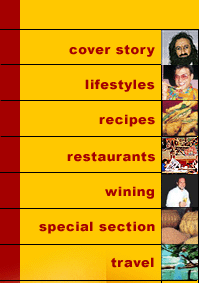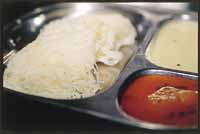


 Forget Idli-Sambar, Have Moode & Padange!
Forget Idli-Sambar, Have Moode & Padange!
Mangalorean breakfast is more than Idli-Sambar, it is also Moode and Padange, Semige and Aapam, discovers UpperCrust. |
|
YES, forget Idli-sambar at least when you are in Mangalore city. Idli-Sambar, Masala Dosai, Wada, these can be had in Udipi restaurants all over the country and even at small stalls on railway stations run by smiling Mangaloreans. When you are in Mangalore, you have Moode and Padange for breakfast. It is the done thing.
Moode is the Idli batter of rice and urad dal that is
steamed in conically-shaped banana leaves and served with red tomato and chilli chutneys, white coconut as well as green mint chutneys. You may also dip the moode in sambar and have, as you would an Idli. The Moode is cooked in a tray-like apparatus. But a pressure cooker works just as well. And Padange is a sprouted green gram dish cooked like a gassi with thick coconut milk.
The Idli batter is naturally fermented by grinding rice and urad dal and keeping it overnight. No yeast is added. When this batter is fermented with fresh toddy, the Idli comes out lighter and more fluffy when steamed. Plus, they have a slightly sour taste of toddy. These are called Sannas by Mangaloreans.
The same Idli batter when steamed in jackfruit leaves is called Kuttige. The Kuttige flavour is stronger than that of the Moode, and it is a popular dish on Mangalorean breakfasts. Breakfast is complete with Aapams or Semige. In Kerala and Tamil Nadu, Semige is known as Idiappam. Or string hoppers. It is, again, made of rice. Rice is the staple diet of the people of the South. Aapams and Semige are had with vegetable gassi or with coconut milk and sugar.
And finish the breakfast with coffee, filter, naturally, and with the coffee beans coming from sunny plantations in Koppa, Chickmagalur district, deep in Karnataka.
|

Home Page
About the mag
Subscribe
Advertise
Contact Us